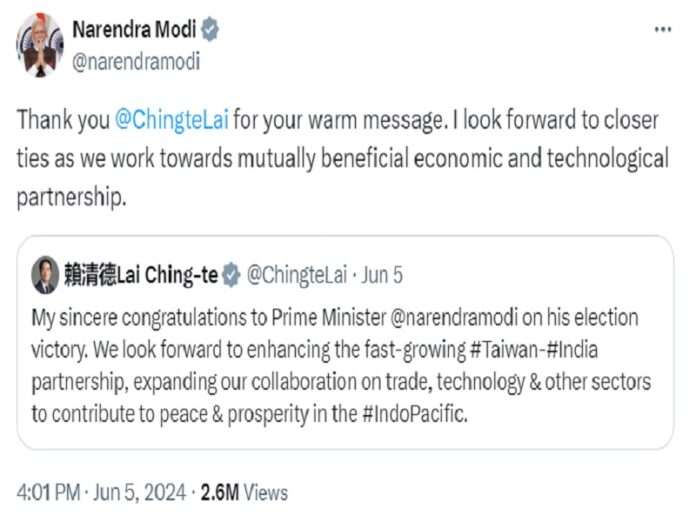Chinese Foreign Ministry spokeswoman Mao Ning confirmed on Thursday that her country has officially protested to India after Prime Minister Narendra Modi publicly thanked Taiwanese leader Lai Ching-te on X for congratulating him on his re-election. She explained that “India has made serious political commitments on [the one-China principle] and is supposed to recognize, be alarmed about and resist the Taiwan authorities’ political calculations”, hence why Beijing is up in arms about this tweet.
The Indian leader knew what he was doing though since he intended to send an unmistakable signal to China as the first manifestation of his third term’s foreign policy. These two Asian Great Powers have been embroiled in a fierce competition over the past four years that almost brought them to the brink of war in summer 2020 after their forces lethally clashed over the Galwan River Valley. The resultant border impasse toxified their ties and now appears to finally be frustrating Prime Minister Modi.
Multiple rounds of negotiations failed to resolve this dispute, especially India’s allegation that Chinese forces remain on Delhi’s side of the Line of Actual Control between them in the Himalayas after having illegally crossed into there in summer 2020, which it claims was the reason behind the aforesaid clashes. Instead of trying to freeze their dispute, China escalated matters by reaffirming its claims to India’s Arunachal Pradesh, which Beijing considers to be “South Tibet” despite only briefly controlling it in 1962.
India is also closely monitoring China’s ongoing border talks with Bhutan due to concerns that Beijing could obtain control over the Doklam Plateau from which it could then threaten the “Chicken’s Neck” connecting “mainland India” with its seven Northeastern States. On top of that, some speculate that China clandestinely armed militants in Manipur ahead of last spring’s unrest, while intelligence officials accused China of masterminding a massive misinformation warfare campaign last fall.
Observers’ opinions about the abovementioned issues are unimportant since all that matters is that Prime Minister Modi believes that they represent continued Chinese meddling in Indian affairs. With that in mind, his tweet can be interpreted as a message to China that two can play this game and that India will no longer remain on the defensive, instead making its own moves whenever it sees fit. Thanking the Taiwanese leader for his congratulations appears harmless but is actually very offensive to China.
From Beijing’s perspective, it suggests that Prime Minister Modi considers Lai to be an equally legitimate leader in the eyes of the international community, which in turn implies tacit acceptance of Taiwanese independence that’s at odds with Delhi’s official policy. India is no small player on the world stage, having grown in renown in recent years as a result of its masterful multi-alignment between top power centers throughout the course of the New Cold War, so this move has immense symbolism.
As the self-styled Voice of the Global South and the world’s most populous country, the words and innuendo of any Indian leader carry lots of weight in terms of reshaping perceptions, much more so than those of his peers in tiny European countries like Lithuania who’ve earlier dabbled in the Taiwan issue. For reasons totally independent of the US’, India could follow that country’s newfound policy of tacitly recalibrating its political – and perhaps eventually military – ties towards Taiwan as a bargaining chip.
The unmistakable message that Prime Minister Modi just sent through his seemingly innocuous but deliberately scandalous tweet is that he’s prepared to play hardball with China during his third term. China can either withdraw to its pre-Galwan position in the Himalayas, abandon its domestically targeted misinformation warfare operations, stop talking about Arunachal Pradesh, and cut off its alleged support of militants in Manipur or deal with the “new normal” of closer Indian-Taiwanese relations.







